Consulting phone:
135-3037-2041
(Mr.Wang)
Product introduction:
In the lithium-ion capacitor, a preliminary charge-discharge experiment was carried out for the purchased lithium-ion farad capacitor. Here are some destructive experiments on the battery.
1. Short circuit test
The energy storage voltage of the purchased lithium-ion farad capacitor is maintained for a long time. After many days of storage, the voltage at both ends of the measured capacitor is still maintained at U0=3.687V. Now short-circuit it to see if the voltage can be released to 0V.
(1) Discharge mode
Directly use a short wire to short both ends of the capacitor. After continuous discharge for about 30 seconds, the measured voltage at both ends of the capacitor has dropped to more than 10 millivolts. Remove the short wire, and the voltage at both ends of the capacitor will return to more than 200 millivolts.
(2) Capacitive heating
During the discharge process, the capacitor continues to heat up. It can be seen that the bottom of the battery has swelled, indicating that the internal solution begins to vaporize, forming an internal high-pressure state.
Product performance table:
series | model | LIC 0813 | LIC 0820 | LIC 1313 | LIC 1020 | LIC 1320 | LIC | LIC | LIC 1840 | |
4.1 | Operating temperature | -40℃-85℃ | ||||||||
4.2 | Operating Voltage | 2.5V-3.8V | ||||||||
4.3 | mixed voltage | 2.5V | ||||||||
4.4 | Standard capacitance (@25±2℃) | 20F | 40F | 70F | 80F | 120F | 250F | 500F | 750F | |
tolerance | -20%~+80% | |||||||||
4.5 | Resistive AC (1KHz, 3.8V) | ≤ 500mΩ | ≤ 200mΩ | ≤ 175mΩ | ≤ 150mΩ | ≤ 100mΩ | ≤ 50mΩ | ≤ 40mΩ | ≤ 25mΩ | |
4.6 | Discharge current | continuous | 100MA | 200MA | 200MA | 250MA | 500MA | 750MA | 2.0A | 3.0A |
Pulse (1 second) | 0.5A | 1.0A | 3.0A | 3.0A | 5.0A | 10.0A | 20.0A | 30.0A | ||
4.7 | Charging voltage/current | 4.2V 200mA | 4.2V 300mA | 4.2V 500mA | 4.2V 500mA | 4.2V 1A | 4.2V 2A | 4.2V 3A | 4.2V 3A | |
4.8 | Mass (G) | ≤1.5 | ≤2.0 | ≤3.0 | ≤3.0 | ≤5.0 | ≤8.0 | ≤15.0 | ≤20.0 | |
4.9 | Storage conditions | +10℃-50℃60%RH | ||||||||
Product Size:
series | φD(mm) | Length(mm) | φD(mm) | P (mm) | Weight (G) | ||||||
BTLIC0813RS3R8020 | 08±1.5 | 13±1.5 | φ0.6±0.1 | 3.5±0.5 | ≤1.5 | ||||||
BTLIC0820RS3R8040 | 08±1.5 | 20±1.5 | φ0.6±0.1 | 3.5±0.5 | ≤2.0 | ||||||
BTLIC1313RS3R8070 | 13±1.5 | 13±1.5 | φ0.6±0.1 | 5.5±0.5 | ≤3.0 | ||||||
BTLIC1020RS3R8080 | 10±1.5 | 20±1.5 | φ0.6±0.1 | 5.5±1.5 | ≤3.0 | ||||||
BTLIC1320RS3R8120 | 13±1.5 | 20±1.5 | φ0.6±0.1 | 5.5±0.5 | ≤5.0 | ||||||
BTLIC1620RS3R8250 | 16±1.5 | 20±1.5 | φ0.8±0.1 | 7.5±0.5 | ≤8.0 | ||||||
BTLIC1640RS3R8500 | 16±1.5 | 40±1.5 | φ0.8±0.1 | 7.5±0.5 | ≤15.0 | ||||||
BTLIC1840RS3R8750 | 18±1.5 | 40±1.5 | φ0.8±0.1 | 7.5±0.5 | ≤20.0 |
Product display:
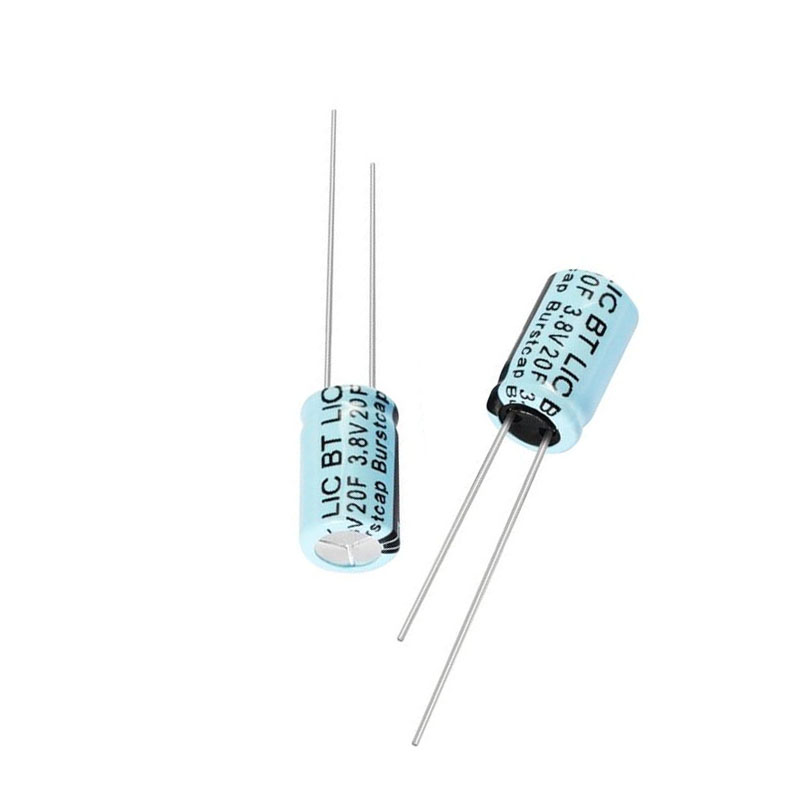
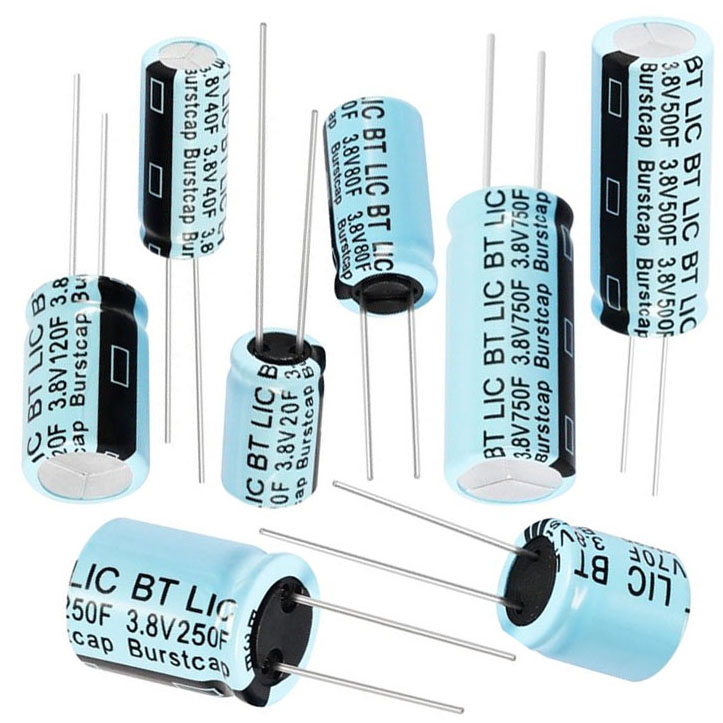
Product Description:
We are lithium-ion capacitor battery, NOT the ordinary lithium-ion battery!
YKY lithium-ion capacitor battery is a new type of high-power battery made by mixing super capacitor and lithium ion battery; one of its electrodes is activated carbon electrode of super capacitor, and the other is lithium ion battery electrode! Therefore, it enjoys the advantages of both of the lithium-ion battery and super capacitor!
1.Ultra-large Capacitance, much larger than ordinary capacitor.
2. High Power Density. The power that can be released instantly is nearly ten times higher than that of ordinary batteries without damaging the batteries.
3. Long Cycle Life. The charge and discharge cycle life is more than 30000-100,000 times, which is one of the biggest advantages. Traditional batteries can only be charged and discharged hundreds of times.
4. Excellent Low Temperature Charge and Discharge Performance. Compared with traditional lithium-ion batteries which will be significantly reduced at low temperatures, YKY lithium-ion capacitor battery can be used normally in an ambient temperature of 40 to 60 degrees.
5. Small Leakage. With super charge retention ability, the leakage is very small, while the traditional battery needs to be charged frequently to maintain the state.
6. Ultra-fast Charging. The charging speed is dozens of times faster than ordinary batteries, and it can fully charge the power required by a car in a few minutes.
7. Environment Friendly & Maintenance-free. It will not cause pollution to the environment itself, and it is truly maintenance-free, while traditional batteries are still pollute the world we live.
Internal resistance, capacity, self-discharge :

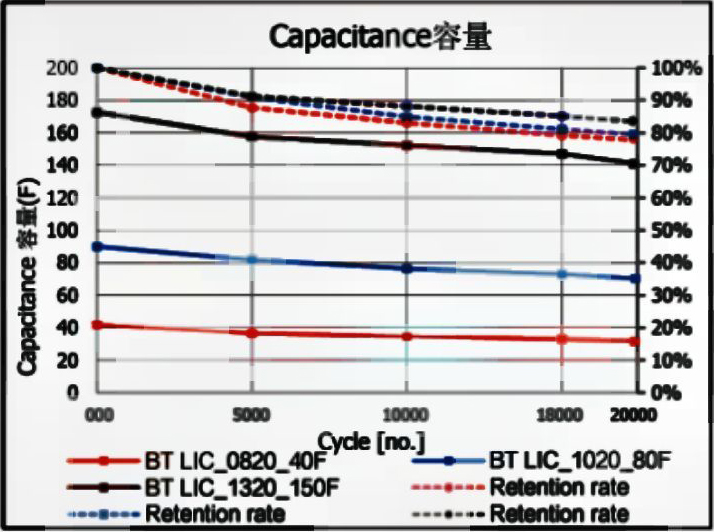
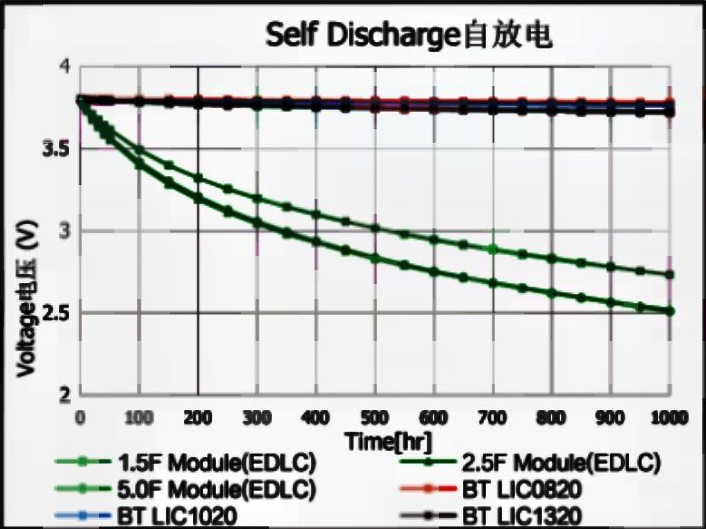
Packaging Specifications:
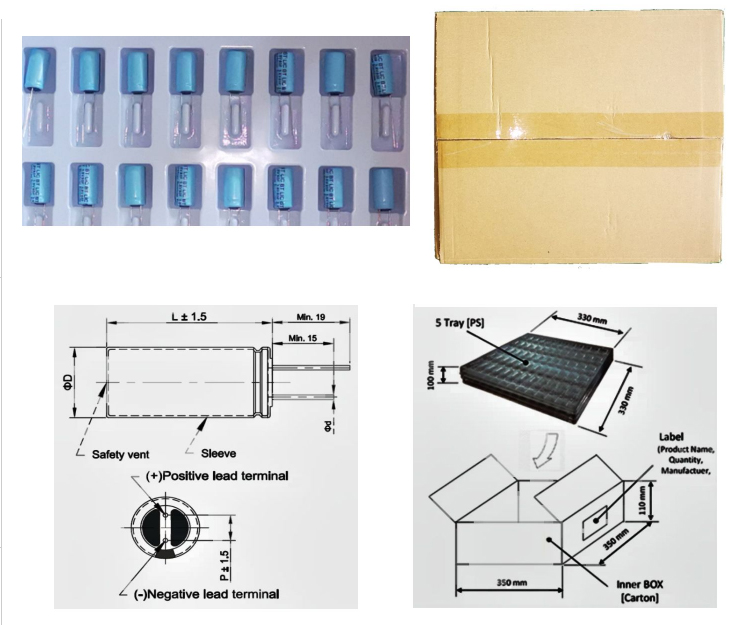
Precautions:
1. Use
1. The operating temperature of lithium-ion capacitors should not exceed the upper or lower limit of the rated temperature (-20 degrees to +55 degrees)
2. Lithium-ion capacitors should be used at nominal voltage. At the same time, in order to prolong the service life of the product, it is recommended that the monomer be used within the range of " rated voltage " (2.5v-3.8v).
3. Please confirm the polarity of lithium-ion capacitors before use, and avoid reverse connection.
4. The external ambient temperature has a heavy impact on the life of lithium-ion capacitors, please keep away from heat sources.
5. Do not directly touch water, oil, acid or alkali for lithium ion capacitors.
6. Do not knead, nail, or disassemble Li-ion capacitors.
7. Do not discard lithium-ion capacitors at will. When discarding, please dispose of them in accordance with national environmental protection standards.
2. Storage
1. During the transportation of lithium-ion capacitors, avoid violent vibration, kneading, rain and chemical corrosion, and handle with care.
2. Lithium-ion capacitors should not be placed in places with a relative humidity of more than 85% or containing toxic gases. In such an environment, the leads and casings are susceptible to moisture and corrosion, resulting in circuit breakers for ultra-fast rechargeable batteries.
3. If the lithium-ion capacitor needs to be stored for a long time, please store it in a place with a temperature of -40~35 degrees, a relative humidity below 50%, and good ventilation.
testing method:
capacity
1 Constant current discharge method
(1) Measurement circuit
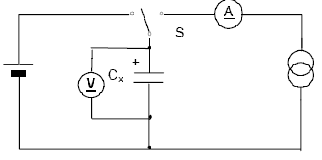
Figure 1 - Constant Current Discharge Method Circuit
2 Measurement method
◎ The DC voltage of the constant current/constant voltage source is set to the rated voltage (UR ) .
◎ Set the constant current value of the constant current charging and discharging device specified in Table 1.
◎ Switch the switch S to the DC power supply, and charge it with constant voltage for 30 minutes after the constant current/constant voltage source reaches the rated voltage.
◎ After charging, switch the switch S to a constant current discharge device to discharge with a constant current.
◎ Measure the time t1 and t2 of the voltage across the capacitor from U1 to U2, as shown in Figure 2, and calculate the capacitance value according to the following equation :
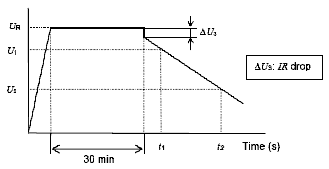
Figure 2 Terminal voltage characteristics of capacitors

in
C capacity (F);
I discharge current (A);
U1 measures the initial voltage (V) ;
U 2 measures the termination voltage (V);
t 1 Time (s) for the discharge voltage to reach U1;
t 2 Time (s) for the discharge voltage to reach U2.
See Table 1 for the discharge current I and the voltages U1 and U2 at which the discharge voltage drops .
3 Equipment: A, ARBIN supercapacitor test system B, linear DC stabilized power supply C, constant current discharge device D, voltage recorder
Internal resistance
Test method: AC impedance method
Measurement circuit
The measurement circuit shown is tested.
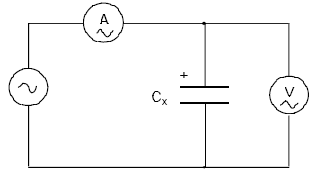
Figure 3 - AC Impedance Method Circuit
Measurement methods
The internal resistance Ra of the capacitor should be calculated by the following formula:

in
Ra AC internal resistance (Ω);
U RMS value of AC voltage (V rms);
I AC current rms value (V rms).
The frequency at which the voltage is measured, should be 1kHz.
The AC current should be 1mA to 10mA.